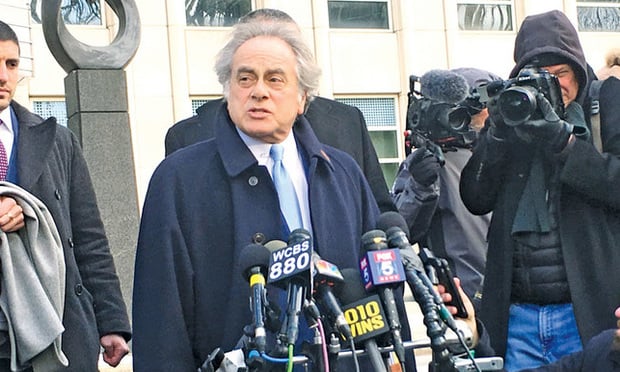Shkreli Gets Seven-Year Prison Sentence for Stock Fraud Conviction
Former pharmaceutical executive Martin Shkreli has been sentenced to seven years in prison after his conviction on three securities fraud counts.
March 09, 2018 at 02:19 PM
6 minute read
 Benjamin Brafman, counsel to former pharmaceutical executive Martin Shkreli, speaks with reporters at the Eastern District courthouse in Brooklyn on March 9, 2018. Photo: Andrew Denney/ALM
Benjamin Brafman, counsel to former pharmaceutical executive Martin Shkreli, speaks with reporters at the Eastern District courthouse in Brooklyn on March 9, 2018. Photo: Andrew Denney/ALM Former pharmaceutical executive Martin Shkreli, who was propelled to fame a few years ago for a massive price increase on a lifesaving drug for people with HIV and AIDS, was sentenced on Friday to seven years in prison for three securities fraud counts.
U.S. District Judge Kiyo Matsumoto of the Eastern District of New York handed down the sentence after a three-hour hearing in which lawyers, the judge and even Shkreli himself painted a complex picture of the disgraced executive and online provocateur who at one point earned the monikers “Pharma Bro” and “most hated man in America.”
Shkreli, who appeared in the courtroom in blue jail scrubs, had provided an emotional statement prior to the sentencing expressing remorse for his offenses and contending that he has worked to better himself during his months at the Metropolitan Detention Center in Brooklyn, but was expressionless as the judge delivered his sentence.
“There is no conspiracy to take down Martin Shkreli—I took down Martin Shkreli with my disgraceful and shameful acts,” Shkreli said during his statement, choking back tears.
But Matsumoto said that Shkreli's conduct translated to an “egregious multitude of lies and abuse of trust” and that her sentence should “protect the public” from Shkreli, promote respect for the law and deter him from re-offending.
Shkreli was convicted in August following a five-week trial of two counts of securities fraud and a related securities fraud for a scheme in which he defrauded investors to two hedge funds he created, MSMB Capital and MSMB Healthcare.
Shkreli later paid back the investors with assets from Retrophin, a pharmaceutical company that he also founded. He conspired with Retrophin's attorney, former Katten Muchin Rosenman partner Evan Greebel, who later became Shkreli's co-defendant, and other co-conspirators to manipulate the price and volume of shares in Retrophin.
In December, Greebel, who was also tried before Matsumoto, was convicted of conspiracy to commit wire fraud and conspiracy to commit securities fraud for his role in the scheme.
Matsumoto sentenced Shkreli to seven years in prison on each of the fraud counts and five years on the conspiracy counts, with the sentences to run concurrently.
The jury acquitted Shkreli of five counts, but he was delivered a series of setbacks in post-conviction proceedings in the months leading up to his sentencing.
In September, Matsumoto revoked Shkreli's bail after he posted a $5,000 bounty for a lock of hair from the head of Hillary Clinton, who was on a book tour at the time, on his Facebook page to some 90,000 followers. Shkreli has been incarcerated ever since.
Matsumoto granted time served for the roughly six months he has spent at the Metropolitan Detention Center in Brooklyn.
On Feb. 26, Matsumoto found that the loss to investors in Shkreli's fraud scheme for his convicted conduct was valued at $10.4 million, rejecting Shkreli's argument that there was no loss and which had a bearing on the calculation of his sentence.
The following week, Matsumoto granted the government's motion to seize $7.36 million of Shkreli's assets, which includes $5 million from a brokerage account and a one-of-a-kind Wu-Tang Clan album that Shkreli said he bought for $2 million.
Shkreli's sentence falls far below the maximum of 33 years suggested by federal sentencing guidelines, but falls in between Shkreli's argument that he should serve up to 18 months with community service and mandated therapy and the government's position that he should serve no less than 15 years.
Matsumoto's sentence also appeared to strike a balance between the competing portrayals presented by federal prosecutors and Shkreli's defense team.
 In this courtroom sketch, Martin Shkreli, left, listens as his lawyer Ben Brafman, second from left, speaks to Judge Kiyo Matsumoto, top right, in federal court on March 9, 2018, in New York. Photo: Elizabeth Williams via AP
In this courtroom sketch, Martin Shkreli, left, listens as his lawyer Ben Brafman, second from left, speaks to Judge Kiyo Matsumoto, top right, in federal court on March 9, 2018, in New York. Photo: Elizabeth Williams via AP In his remarks before the judge, Benjamin Brafman, Shkreli's lead counsel, reiterated a theme he has emphasized throughout the trial: that Shkreli is a misunderstood and slightly off-beat wunderkind who sometimes shoots off his mouth in public statements, but who never intended to defraud his investors, noting that the investors who were affected by the scheme all ended up making money.
“There were times when I wanted to hug him and hold him,” Brafman said. “There were times I wanted to punch him in the face.”
Brafman also worked to cut a more sympathetic figure of his client during his roughly hour-long argument, discussing his charitable works and saying Shkreli's been teaching math to fellow MDC inmates and helping them get books,
But Assistant U.S. Attorney Jacquelyn Kasulis of the Eastern District, who presented arguments for the government, cast Shkreli as a self-serving fraudster who was interested in getting rich, saying that he was convicted of running four different fraud schemes over a five-year period.
“He wants everyone to believe he is a genuine whiz kid, a self-taught biotech wonder, the richest man in New York City,” Kasulis said. “Without that image he is nothing.”
Matsumoto said that Shkreli's “self-cultivated” public persona did not have a bearing on her sentence, nor did his price hike on Daraprim, a potentially life-saving drug for people who suffer from HIV and AIDS, from $13.50 per pill to $750, which initially propelled him to fame.
Matsumoto also gave Shkreli a downward departure in her sentencing calculation for his charitable donations, which included a $1 million donation to Hunter College High School and support for an LGBT advocacy group.
But the judge said that Shkreli repeatedly lied to MSMB investors and strung them along for years about the performance of their investments. She also read Shkreli's statements about an investor who wanted out of the scheme, in which Shkreli said he threatened the investor and his family.
Kasulis was joined on the prosecution team by Assistant U.S. Attorneys Alixandra Smith and Girish Srinivasan.
“For years, Shkreli told lie after lie in order to steal his investors' money, manipulate the
stock market and enrich himself,” said interim U.S. Attorney Richard Donoghue in a news release. “He will now pay the price for repeatedly violating the trust placed in him by his investors, his employees and the public.”
In a brief news conference outside the Eastern District courthouse in Brooklyn, Brafman said he was disappointed with the sentence.
“The government didn't get what they wanted,” Brafman said. “We didn't get what we wanted, either.”
Shkreli's defense team also included Brafman & Associates attorneys Marc Agnifilo, Andrea Zellan, Jacob Kaplan and Teny Geragos.
This content has been archived. It is available through our partners, LexisNexis® and Bloomberg Law.
To view this content, please continue to their sites.
Not a Lexis Subscriber?
Subscribe Now
Not a Bloomberg Law Subscriber?
Subscribe Now
NOT FOR REPRINT
© 2025 ALM Global, LLC, All Rights Reserved. Request academic re-use from www.copyright.com. All other uses, submit a request to [email protected]. For more information visit Asset & Logo Licensing.
You Might Like
View All
Orrick Hires Longtime Weil Partner as New Head of Antitrust Litigation

Ephemeral Messaging Going Into 2025:The Messages May Vanish But Not The Preservation Obligations
5 minute read

SEC Official Hints at More Restraint With Industry Bars, Less With Wells Meetings
4 minute readTrending Stories
- 1AIAs: A Look At the Future of AI-Related Contracts
- 2Litigators of the Week: A $630M Antitrust Settlement for Automotive Software Vendors—$140M More Than Alleged Overcharges
- 3Litigator of the Week Runners-Up and Shout-Outs
- 4Linklaters Hires Four Partners From Patterson Belknap
- 5Law Firms Expand Scope of Immigration Expertise, Amid Blitz of Trump Orders
Who Got The Work
J. Brugh Lower of Gibbons has entered an appearance for industrial equipment supplier Devco Corporation in a pending trademark infringement lawsuit. The suit, accusing the defendant of selling knock-off Graco products, was filed Dec. 18 in New Jersey District Court by Rivkin Radler on behalf of Graco Inc. and Graco Minnesota. The case, assigned to U.S. District Judge Zahid N. Quraishi, is 3:24-cv-11294, Graco Inc. et al v. Devco Corporation.
Who Got The Work
Rebecca Maller-Stein and Kent A. Yalowitz of Arnold & Porter Kaye Scholer have entered their appearances for Hanaco Venture Capital and its executives, Lior Prosor and David Frankel, in a pending securities lawsuit. The action, filed on Dec. 24 in New York Southern District Court by Zell, Aron & Co. on behalf of Goldeneye Advisors, accuses the defendants of negligently and fraudulently managing the plaintiff's $1 million investment. The case, assigned to U.S. District Judge Vernon S. Broderick, is 1:24-cv-09918, Goldeneye Advisors, LLC v. Hanaco Venture Capital, Ltd. et al.
Who Got The Work
Attorneys from A&O Shearman has stepped in as defense counsel for Toronto-Dominion Bank and other defendants in a pending securities class action. The suit, filed Dec. 11 in New York Southern District Court by Bleichmar Fonti & Auld, accuses the defendants of concealing the bank's 'pervasive' deficiencies in regards to its compliance with the Bank Secrecy Act and the quality of its anti-money laundering controls. The case, assigned to U.S. District Judge Arun Subramanian, is 1:24-cv-09445, Gonzalez v. The Toronto-Dominion Bank et al.
Who Got The Work
Crown Castle International, a Pennsylvania company providing shared communications infrastructure, has turned to Luke D. Wolf of Gordon Rees Scully Mansukhani to fend off a pending breach-of-contract lawsuit. The court action, filed Nov. 25 in Michigan Eastern District Court by Hooper Hathaway PC on behalf of The Town Residences LLC, accuses Crown Castle of failing to transfer approximately $30,000 in utility payments from T-Mobile in breach of a roof-top lease and assignment agreement. The case, assigned to U.S. District Judge Susan K. Declercq, is 2:24-cv-13131, The Town Residences LLC v. T-Mobile US, Inc. et al.
Who Got The Work
Wilfred P. Coronato and Daniel M. Schwartz of McCarter & English have stepped in as defense counsel to Electrolux Home Products Inc. in a pending product liability lawsuit. The court action, filed Nov. 26 in New York Eastern District Court by Poulos Lopiccolo PC and Nagel Rice LLP on behalf of David Stern, alleges that the defendant's refrigerators’ drawers and shelving repeatedly break and fall apart within months after purchase. The case, assigned to U.S. District Judge Joan M. Azrack, is 2:24-cv-08204, Stern v. Electrolux Home Products, Inc.
Featured Firms
Law Offices of Gary Martin Hays & Associates, P.C.
(470) 294-1674
Law Offices of Mark E. Salomone
(857) 444-6468
Smith & Hassler
(713) 739-1250






